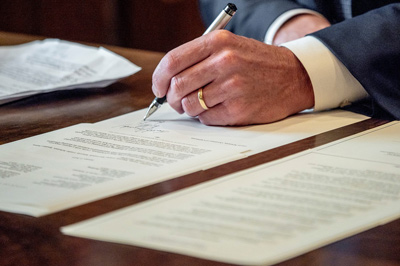September 18, 2024 - SAN FRANCISCO – Taking action to address the use of deepfakes and other deceptive digitally  generated or altered content in election campaigns, Governor Gavin Newsom on Tuesday signed three measures to remove deceptive content from large online platforms, increase accountability, and better inform voters.
generated or altered content in election campaigns, Governor Gavin Newsom on Tuesday signed three measures to remove deceptive content from large online platforms, increase accountability, and better inform voters.
“Safeguarding the integrity of elections is essential to democracy, and it’s critical that we ensure AI is not deployed to undermine the public’s trust through disinformation – especially in today’s fraught political climate. These measures will help to combat the harmful use of deepfakes in political ads and other content, one of several areas in which the state is being proactive to foster transparent and trustworthy AI.”
Governor Gavin Newsom
Earlier today, the Governor announced signing legislation to protect the digital likeness of actors and performers by ensuring that AI is not used to replicate their voice or likeness without their consent.
Building on legislation signed by the Governor in 2019 to crack down on deepfakes in elections, the Governor today signed three bills related to election advertisements and communications.
AB 2655 by Assemblymember Marc Berman (D-Menlo Park) requires large online platforms to remove or label deceptive and digitally altered or created content related to elections during specified periods, and requires them to provide mechanisms to report such content. It also authorizes candidates, elected officials, elections officials, the Attorney General, and a district attorney or city attorney to seek injunctive relief against a large online platform for noncompliance with the act.
“AI-generated deepfakes pose a clear and present risk to our elections and our democracy. AB 2655 is a first-in-the-nation solution to this growing threat, and I am grateful to Governor Newsom for signing it. Advances in AI over the last few years make it easy to generate hyper-realistic yet completely fake election-related deepfakes, but AB 2655 will ensure that online platforms minimize their impact. The new law is a win for California’s voters, and for our democracy,” said Assemblymember Berman.
AB 2839, an urgency measure by Assemblymember Gail Pellerin (D-Santa Cruz), expands the timeframe in which a committee or other entity is prohibited from knowingly distributing an advertisement or other election material containing deceptive AI-generated or manipulated content. The bill also expands the scope of existing law to prohibit materially deceptive content of elected officials, candidates, elections officials and others, authorizing them to file a civil action to enjoin the distribution of such material.
“Signing AB 2839 into law is a significant step in continuing to protect the integrity of our democratic process. With fewer than 50 days until the general election, there is an urgent need to protect against misleading, digitally-altered content that can interfere with the election. With the enactment of AB 2839, California is taking a stand against the manipulative use of deepfake technology to deceive voters. I’m thankful that Governor Newsom signed this legislation to ensure that voters are equipped with the accurate information they need to make informed decisions this November,” said Assemblymember Pellerin, Chair of the Assembly Elections Committee.
AB 2355 by Assemblymember Wendy Carrillo (D-Los Angeles) requires that electoral advertisements using AI-generated or substantially altered content feature a disclosure that the material has been altered. The bill authorizes the Fair Political Practices Commission to enforce a violation of these disclosure requirements by seeking injunctive relief to compel compliance or pursuing other remedies available to the commission under the Political Reform Act.
“I applaud the Governor for signing AB 2355, my proposal mandating that political advertisements using content created or significantly altered by generative AI, include a clear disclosure of this fact. The availability of tools to doctor images, video, and sound is not new. However, the rapid improvements in AI and Large Language Models have made it easier to create convincingly fake images, videos, and sounds. As these technologies become more accessible and are used in political campaigns, their impact on democracy requires urgent action. Voters must be informed when generative AI is used in political advertising to substantially alter media or create misleading content. Free speech and political expression are a cornerstone of our democracy, but we cannot lose sight of our humanity amid the advancement of artificial intelligence. This is a balanced policy that makes California the first state to include artificial intelligence under its campaign transparency rules,” said Assemblymember Carrillo.
Home to the majority of the world’s leading AI companies, California is working to harness these transformative technologies to help address pressing challenges while studying the risks they present. The state last month partnered with NVIDIA to launch a first-of-its-kind AI collaboration, and earlier hosted an AI summit convening leaders from across technology, labor, government, and academia to discuss how the technology can be used to benefit Californians. Last year, Governor Newsom signed an executive order laying out California’s measured approach focused on shaping the equitable and responsible use of AI while remaining at the forefront of AI innovation.
Source: Office of the Governor








